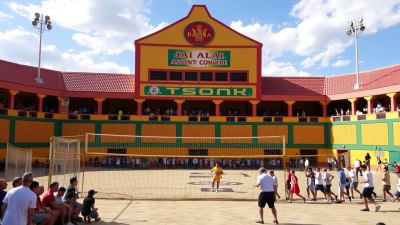The Culture of Jai Alai and its Basque Origins
Explore the rich culture of Jai Alai and its fascinating Basque roots, history, and significance in sports.

Image created with Flux Schnell
Jai Alai, a sport with deep historical and cultural roots, is often referred to as the fastest game on earth due to its high-speed ball dynamics.
This unique sport originated in the Basque region of Spain and has spread worldwide, becoming particularly popular in the United States and Latin America.
The origins of Jai Alai can be traced back to the 17th century, with its first recorded mention appearing in a text in 1875.
Its name, when translated, means 'merry festival', which aptly reflects the joyful and dynamic nature of the game.
Historical Background
The history of Jai Alai is closely tied to the Basque culture, with many aspects of the game reflecting Basque traditions and lifestyles.
Originally played in the streets, Jai Alai evolved to find a dedicated space known as a 'fronton', which is a court designed specifically for the sport.
By the late 19th century, Jai Alai had gained significant popularity, prompting organized competitions and formalized rules.
The game became a staple in Basque festivals, where it was often played for entertainment, showcasing speed and agility.
Gameplay Mechanics
The game is played in teams or as singles, with players using a curved wicker cesta to catch and throw a ball called a 'pelota'.
A key feature of Jai Alai is the size and speed of the pelota, which can travel over 300 kilometers per hour.
This unique element of the sport and the skills required to play it have made Jai Alai an exciting spectacle.
The objective is to score points by throwing the pelota against the front wall in such a way that the opponent cannot return it.
Evolution and Spread
Jai Alai made its way to the Americas in the late 19th century as Basque immigrants introduced it to new audiences.
The first fronton in the United States opened in 1904 in Tampa, Florida, marking the beginning of Jai Alai's history in North America.
Throughout the 20th century, Jai Alai enjoyed a surge in popularity, particularly in Florida, where it became a staple of entertainment in the mid-20th century.
However, by the late 20th century, the sport began to decline due to various factors including changing entertainment trends and the economic realities of maintaining frontons.
Cultural Significance
Jai Alai holds significant cultural importance in Basque communities, not only as a sport but also as a reflection of Basque identity.
Many Basque events and festivals incorporate Jai Alai, emphasizing the sport's role in preserving Basque heritage and tradition.
Moreover, it is seen as a means of cultural expression and community cohesion, particularly among Basques in the diaspora.
Modern Revival and Future
Despite its decline in certain areas, there have been recent efforts to revive Jai Alai through various initiatives aimed at attracting new players and audiences.
Innovations in gameplay, marketing strategies, and the incorporation of technology have been proposed to make the sport more appealing.
Modern Jai Alai is now tackling challenges by restructuring its engagement methods, even exploring possibilities for betting to draw interest.
The culture of Jai Alai is deeply intertwined with its Basque origins, embodying a rich tapestry of tradition, skill, and community spirit.
As efforts to revive and modernize the sport continue, Jai Alai stands poised to capture the attention of a new generation.
Its unique gameplay and historical significance ensure that it remains a beloved part of the Basque cultural heritage.
Jai Alai is not just a game; it's a living tradition that tells the story of the Basque people and their enduring spirit.











